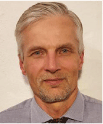Session 27. Oral Presentation for: The Bayu-Undan liquid CO2 import facilities – finding an effective solution
Ross Weiter A *A

Ross Weiter is a Principal Consultant at Worley Consulting, where he is also the Carbon Capture Utilisation and Storage (CCUS) Lead for the Asia-Pacific Region. He has 32 years of experience in all areas of the upstream oil and gas industry. This includes time spent in concept engineering, front end design, detail design, operation support and site work. His CCUS experience includes work for Occidental, BP, Woodside, Santos, Wesfarmers, Arctic LNG2, Woodside, ConocoPhillips, Chevron and others. He carried out many studies covering design, workshop facilitation, technology assessment, risk assessment and costing. Ross spent most of his career working in Perth, with 3 years in Muscat with Petroleum Development Oman. Ross holds a Bachelor of Engineering (Chemical Engineering, Hons II) from Curtin University of Technology, Perth and is a Member of IChemE and the Society of Petroleum Engineers. He completed a short course in Sustainability Management Leadership by the University of Cambridge. |
Abstract
Presented on Thursday 23 May: Session 27
Carbon capture and storage (CCS) is widely considered to be one of the key enablers to decarbonising the economy. It is currently being implemented in a number of projects in gas, power, chemicals, cement, steel, and other industries. In the Asia–Pacific region, shipping of liquid carbon dioxide (LCO2) is widely seen as a key component of the CCS value chain. Shipping allows the emitters located in the industrial centres of Japan, Korea, and Singapore to access distant CO2 storage locations. The repurposing of the Bayu-Undan (BU) platforms and pipeline from gas production to CO2 injection presents a regional opportunity for the disposal of shipped CO2. Multiple LCO2 development concepts were assessed for unloading and storing the imported LCO2. Unloading can be carrier-to-shore, carrier-to-ship/barge, or carrier-to-platform; storage can be onshore, nearshore, offshore or no buffer storage at all with direct injection from carriers. These concepts required evaluation for technical functionality, maturity, complexity, operability, and availability. Imported LCO2 is too cold and low pressure to be transported or injected at the carrier transport conditions. The pressure needs to be boosted and temperature increased to meet the requirements of the injection system. This requires sources of power and heat. An evaluation of existing facilities, their condition, available space and spare capacity, and their constructability considerations revealed important opportunities and constraints. A study was carried out, which evaluated options for the BU LCO2 import using key evaluation criteria to select the most appropriate concept. This paper explores addressing the challenges involved.
To access the Oral Presentation click the link on the right. To read the full paper click here
Keywords: carbon capture and storage, carbon dioxide, CCS, CCUS, CO2, CO2 storage, LCO2, liquid CO2.
 Ross Weiter is a Principal Consultant at Worley Consulting, where he is also the Carbon Capture Utilisation and Storage (CCUS) Lead for the Asia-Pacific Region. He has 32 years of experience in all areas of the upstream oil and gas industry. This includes time spent in concept engineering, front end design, detail design, operation support and site work. His CCUS experience includes work for Occidental, BP, Woodside, Santos, Wesfarmers, Arctic LNG2, Woodside, ConocoPhillips, Chevron and others. He carried out many studies covering design, workshop facilitation, technology assessment, risk assessment and costing. Ross spent most of his career working in Perth, with 3 years in Muscat with Petroleum Development Oman. Ross holds a Bachelor of Engineering (Chemical Engineering, Hons II) from Curtin University of Technology, Perth and is a Member of IChemE and the Society of Petroleum Engineers. He completed a short course in Sustainability Management Leadership by the University of Cambridge. |


